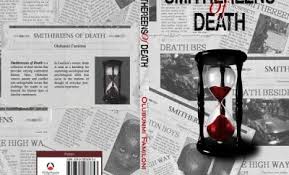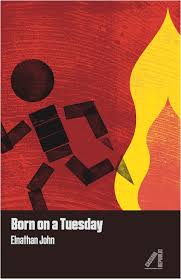Hello to my 12 or so followers and every other person that will read this post. I should have publish this earlier this year, but my day job happend to it. So about this time last year I started this docu-blog to write about the books I am reading every month.
Well my followers know how that turned out, how my steam went from hot to warm, and warm to cold. I am so sorry for that. My day job never gave me much chance to sneek in on here.
But all in all, 2016 was an amazing year for me as regards reading, I read more books in a year than I have ever done. I joined two book clubs, The Port Harcourt Book Club and the online twitter The Read Club. These book clubs, they were among the best things that happened to my reading life.
I made new bookworm friends, both online and in physical. I learned new perspectives, learned others point of views, and their approach towards books especially fiction, and did I mention that I am bias towards African Literature, Nigerian Literature in Particular.I had an amazing, amazing experience.
So last year I read over 60 books, both hard copies and ebooks. The amazing thing is that I was able to break beyond just Fiction a bit. And truth be told it felt good. I read the good, the bad and the ugly. I mean some writers sure know how to ruin one’s reading bud for weeks in some cases. Don’t mind me, I hope those writer get better at their craft. It is not easy, I know.
So out of all the books I read These ones stood out.
1. Season of Crimson Blossom – Abubakar Adam Ibrahim
This is was my best book of last year. In fact I could not write a review on it until weeks after I had finished reading it. I kept churning the theme flushes, the writing style, the context, the plot and how really importantly urgent what the book discuses is. Wonderful wonderful book. Find my little say about it here.
2. Blackass – Igoni A. Barett
This is another wonderful book that gripped me in 2016. How one creates a story and infuse it with a spalsh of colour (Both aesthetically and in real form). This book takes a trivial and turns it into an open endeded discourse that pokes discourses which transcends the words, plot and the story itself. The humour, the highs and lows, the mature handling of characters all improved for Igoni in this one.
3. Under the Udala Tree – Chinelo Okparanta
This book captures a topic that challenges the ‘norm’ ( whatever that is and whoever defined it), and rolls it into a historical period in Nigeria.
Fantastic story of a leasbian who grew up to know herslef, and also to know that her type were not acceptable as normal. She danced from the solitary pleasures of her sexuality to the rejection by her guardians, mother and even her first gay partner.
This book is about denial and acceptance. Very graphic,lyrical and poetic. Chinelo style is not new, but she adds a touch of touché to hers that make her writing stand out. She pens like a bard. And l love the way she recalls stories withing stories without getting the reader lost and bored up. This one is a reader people. Definately one of 2016’s best.
4. Born on A Tuesday – Elnathan John
Have you ever wondered what life is like for an Almajiri. Google that word, if it is new to you, because that is one of the strongest point about this book, that I give the author a big thumbs up for. Superb story, written with no particular audience in mind. No spoon feeding with italics of local words and footnote. I mean who rebels the publishing world like that. Elnathan of course. Baba!
It tells the story of Dantala an almajiri that discovers the way the world works from his own side of the planet. Despair, hope, loss, love, discovery, and a sense of strive and survival are all over the pages of this one.
The platform for the presentation of this is religion and politics, cooked in a territorial context that exposes the unique life of the Northern Nigeria. It is an exposé kind of. I love this book. Find my review here.
5. Nairobi Heat – Ngugi Wa’ Koma
I don’t know how I have escpaed reading this book up until now. I personally, am tired of diaspora writings of Africa, not that they are bad, but writer shot us many of it that I got filled at some point. But this one gave me a different thought.
An American-Afican finds his work as a detective take him back home. He feels foreign in his own skin and root. And he finds a whole story that is bigger that the death of a blond girl ropped around a certain black man.
Beyond the race discourse and the integrity of the black race in US police force, the author takes us through a flash of the Rwanda genocide and opens up the evil that men do and perpetrate during war. The trick about this one is the twist on a supposed hero.
Please people, reaf this book. I dont want to be a spolier. It is a good one.and one of my non Nigerian read of last year.
6. Easy Motion Tourist – Leye Adenle
‘Fast and Furious’ are the words that open one of the good reads review of this book, and true that is what this book is all about. A lunch into the crime scenes of the city that never sleeps in Africa, Lagos.
So when we see bodies mutilated, dropped off in the streets and we think of ritualist as the only ones that do such, this book gives a new perspective about it. Organ harvesting and exportation has become more organized than we know. This book is an exposé.
The media, the police force, journalists and the internationa mediall take a chunk of this fast paced triller. Find it people. Leye nailed Lagos to the pages of this book.
7. Sarah House – Ifeanyi Ajaegbo
Thank heavens for book clubs, that is how I came across this book, it was one of the books of the months at the @ThePHCBookClub last year.
Just like Leye’s EMT, this is debut and a crime fiction. But this one tugged at my chest particulaerly because it is set in Port Harcourt. I grew up and still live in this city.
The story of Nita is not new among that of girls rescued from prostituion, but Ifeanyi adds guts and vividness to this. Beyond prostitution is child trafficking and organ harvesting ring that exists right at the heart if the city.
The images in this book come alive in your mind many days after reading it. It detailed, but I must say that the end is quite someway. I want to believe there is a sequel coming up. Fantastic book by the way.
8. Walking Shadows – Jude Dibia
The word ‘Gay’ gets eyes squinting, ears twitching and heads turning when spoken in certain spaces especially in Nigeria. It however has become more heard of than it used to be. This novel is a bebut, and the first of its kind in narratives, to openly engage a discourse about Gay people in the Nigerian Literary scene, some credit goes to baba Wole Soyinka for this, but this book takes it all up and throws it open.
And that was at a time when it was uncommon in the world of Nigerian Narratives. It is about the discovery, denial and the seeking of a acceptance in a society that sees less of queer people.
If you are interested in the story of the becoming of a gay man who, as friend says, tries to con the system about his sexuality and got shot at the foot, read this one. It is a expository though the writer went for a comfortable end. It is still a good one.
So there my 2016 was outstanding with those. Thanks.















